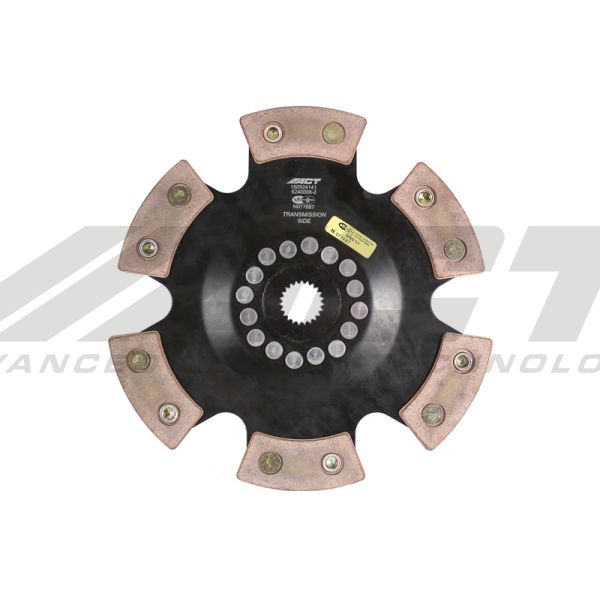6240008-2 - ACT 6 Pad Rigid Race Clutch Disc
Note: Must be used with ACT pressure plate and factory flywheel (not included).
Specifications
| Item Description | ACT 6 Pad Rigid Race Clutch Disc |
|---|---|
| Product Weight (lbs.) | 2.5 |
| Disc Material | Ceramic |
| Diameter (Inches) | 9.4 |
| Diameter (Millimeters) | 240 |
| Warranty | 12 Months (view details) |
| SFI | 1.1 |
Description
6240008-2 is a 6-pad rigid race disc made with high quality ceramic friction materials. The disc engagement is harsher, but shifting is faster. The race disc features top grade rivets to securely fasten the part together. The rivet design and materials are carefully selected for maximum strength. The 6-pad rigid race disc is recommended for larger clutch sizes to absorb more heat and for smoother engagement.
| Feel | Aggressive engagement, quick shifts, increased gear rattle |
|---|---|
| Life | Premium ceramic friction materials provide moderate wear rates and high heat tolerance, rigid design may increase spline wear |
| Quality | Lightweight rigid design, chromoly hub is heat-treated for strength and durability |
| Recommended Use | Recommended for high horsepower street or race use |
| ACT Difference | High burst strength and holds 28% more torque than typical organic materials |
Vehicle Fitment
| Application | Engine |
|---|---|
| 2008 Dodge Caliber SRT-4 | 2.4 L4 GAS FI 2360cc | Turbocharged |
| 2009 Dodge Caliber SRT-4 | 2.4 L4 GAS FI 2360cc | Turbocharged |
| 2013 Ford Focus ST | 2.0 L4 GAS FI 1999cc | DOHC |
| 2014 Ford Focus ST | 2.0 L4 GAS FI 1999cc | DOHC |
| 2015 Ford Focus ST | 2.0 L4 GAS FI 1999cc | DOHC |
| 2016 Ford Focus RS | GAS FI |
| 2016 Ford Focus ST | GAS FI |
| 2017 Ford Focus RS | GAS FI |
| 2017 Ford Focus ST | GAS FI |
Frequently Asked Questions
- Can an ACT Race puck-style disc be used for daily driving, and is it recommended?
- ACT's race discs are very aggressive and provide no-nonsense performance response. As a result, the engagement is harsh. Taking off from a stop can cause judder and/or an uncomfortable noise. These characteristics have no effect on the performance on the clutch or the drive line components. This type of disc should only be used in a professional race setting and never on the street. ACT always recommends using an organic disc on the street because it offers a smoother engagement and a longer lasting performance value for everyday drivers.
- When should a clutch disc be replaced?
- The majority of new discs measure .312-.315” (7.93 – 8.00mm) thick – fully worn is .275” (7.00mm) or below. A few applications (mostly Audi and BMW) start out at .332 - .335” (8.43 – 8.50mm). These are to be replaced when below .295” (7.50mm). It’s best to measure with a micrometer. Puck discs are measured as-is, where organic street discs are correctly measured by fully compressing the engagement cushion (marcel) between the linings. If the lining rivets on either side of the disc have made contact with the flywheel or pressure plate face, the disc must be replaced. Note: Using a disc that is thicker or thinner than the working range the pressure plate is designed for will have varying, and often very poor, results.
PROP 65 WARNING
This product can expose you to chemicals including carbon black, glass wool fibers, and silica (in clutch discs), chromium and nickel, which are known to the State of California to cause cancer or birth defects or other reproductive harm. for more information, visit www.P65Warnings.ca.gov


